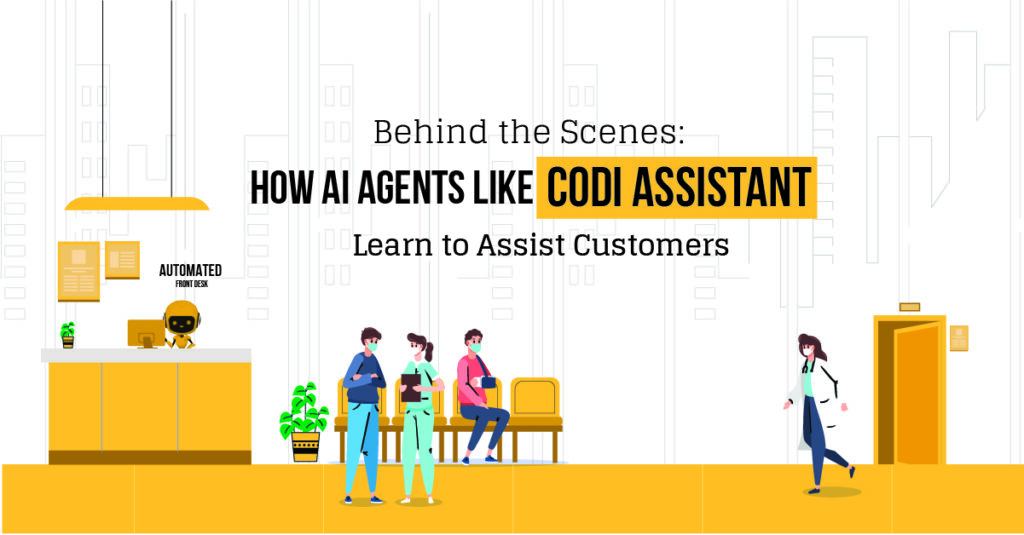In today’s healthcare industry, clinics, hospitals, and even banking institutions face mounting challenges in delivering exceptional experiences while managing administrative inefficiencies, often turning to an AI virtual assistant for support. As the demand for quality care grows, so does the need for innovative solutions like self-service artificial intelligence and conversational AI to streamline processes. Enter AI-powered service assistants like Codi Assistant, designed to transform the way front desks operate in healthcare settings.
But have you ever wondered how AI agents like Codi Assistant learn to become your front desk’s most reliable team member? Let’s pull back the curtain and explore the journey of building an AI-powered assistant that’s tailored to meet the unique needs of clinics and hospitals.
Understanding the Learning Process of AI Assistants
AI agents aren’t just programmed with a one-size-fits-all solution—they evolve through a robust process that mimics human learning. Here’s how an AI virtual assistant like Codi Assistant comes to life:
1. Understanding the Front Desk Ecosystem
The first step in developing AI assistants is understanding the daily challenges faced by front desk staff in Health Care. These customer interactions are repetitive yet critical, from appointment scheduling and patient check-ins to fielding endless phone calls in a contact center.
Codi Assistant is designed to analyze these workflows and identify pain points to enhance productivity. By studying data from real-world scenarios, it learns to replicate and improve these tasks, ensuring seamless patient interaction. This makes it the perfect solution for AI appointment scheduling and automating customer service.
2. Training with Contextual Data
For an AI assistant to effectively improve customer service and experience, it must understand the nuances of healthcare-specific interactions. Codi Assistant is trained on vast datasets that include:
- Natural language conversations to interpret patient queries accurately.
- Healthcare workflows, such as insurance verification and medical records management.
- Regulatory compliance, ensuring that every interaction aligns with HIPAA standards.
This contextual training ensures that Codi Assistant can handle even the most complex patient inquiries with precision and speed, making it an essential tool for AI call center automation, contact center, and banking improvements in healthcare.
3. Leveraging Conversational AI
Patients expect natural, human-like conversations, even when interacting with AI assistants, AI virtual assistants, and conversational AI assistants. Thanks to advancements in Natural Language Processing (NLP), artificial intelligence, and machine learning, Codi Assistant can engage patients with empathy and accuracy.
For instance, when a patient calls to reschedule an appointment, Codi Assistant not only recognizes the request but also considers the clinic’s availability, patient preferences, and urgency—all in real-time. This capability highlights the potential of AI customer service automation to elevate patient satisfaction and enhance the overall customer experience.
4. Continuous Learning and Improvement
One of the most remarkable features of AI agents like Codi Assistant is their ability to learn continuously from customer interactions. By analyzing past interactions, identifying patterns, and incorporating feedback from users, Codi Assistant becomes smarter and more efficient over time.
This adaptability ensures that it stays aligned with your clinic’s evolving needs and delivers consistent value to both staff and patients.
Why Clinics and Hospitals Need Codi Assistants Today
Healthcare front desks are often overwhelmed, leading to long wait times, miscommunications, and frustrated patients, but by integrating an AI virtual assistant, such as Codi Assistant, you can improve productivity and enhance customer service: By integrating Codi Assistant as a virtual self-service assistant into your operations, you can improve productivity and enhance customer service:
- Automate repetitive tasks, improving productivity by freeing staff to focus on patient care.
- Enhance patient satisfaction, customer service, and customer experience through quicker responses, personalized interactions, and improved customer interactions.
- Reduce operational costs, as Codi Assistant works 24/7 without breaks.
- Ensure compliance, safeguarding sensitive patient information.
Whether it’s managing patient calls, handling appointment scheduling, or automating follow-ups, Codi Assistant, an AI virtual assistant, offers the kind of self-service contact center efficiency that can revolutionize your clinic’s front desk operations. This is AI service assistant technology at its finest, including AI assistants offering potential applications even in the banking sector.
The Future of Patient Engagement Starts Here
The rise of AI-powered assistants like Codi Assistant, which utilizes conversational AI and artificial intelligence, reshapes the healthcare landscape, enabling clinics and hospitals to deliver more streamlined and patient-centric experiences. By automating front desk operations, Codi Assistant isn’t just a tool—it’s a partner in your mission to provide top-notch care.
By implementing AI call center automation, AI virtual assistant technology, and AI customer service automation, healthcare providers can save time, reduce costs, and improve patient satisfaction like never before.
Are you ready to embrace the future of healthcare administration? Discover how Codi Assistant can transform your clinic’s front desk today.

